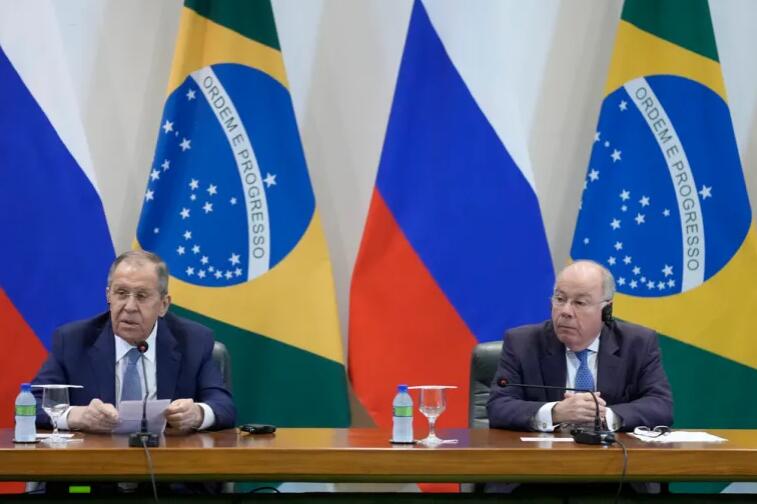Russian Foreign Minister Sergey Lavrov is set to meet Brazilian President Luiz Inacio Lula da Silva, whose stance on Moscow’s invasion of Ukraine has been met with ire by the United States and other Western nations.
Lavrov arrived in the capital Brasilia on Monday, where he discussed issues such as trade and Russia’s war in Ukraine with members of Lula’s administration.
“We are grateful to our Brazilian friends for their clear understanding of the genesis of the situation [in Ukraine]. We are grateful for their desire to contribute to finding ways of settling this situation,” Lavrov said after meeting with Brazilian Foreign Minister Mauro Vieira.
In recent weeks, Lula has angered Western countries by stating that several parties are at fault for the war in Ukraine and that the US has “encouraged” the war by sending weapons to the administration of Ukrainian President Volodymyr Zelenskyy.
On Monday, White House National Security spokesperson John Kirby called Lula’s comments “simply misguided”. In Brasilia, a handful of protesters held banners denouncing Lavrov’s visit and Russia’s invasion.
Lula’s stance has underscored a schism between Ukraine’s Western allies and non-Western countries who do not want to choose between relations with Russia and the US, instead refusing to distance themselves from Moscow.
In the year following the invasion of Ukraine, for instance, the United Nations General Assembly (UNGA) voted on a series of resolutions to address the violence, including a call for Russia to withdraw its military and a resolution to condemn the annexation of territory.
But some of the world’s most populous countries — including China, India and Brazil — have abstained from voting in some cases.
One example came on April 7, 2022, when the General Assembly passed a resolution to suspend Russia from the UN Human Rights Council, with 93 votes in favour. But 58 countries abstained and another 24 voted against the proposal. Brazil was among the abstentions.
States like Brazil have also baulked at calls to provide Ukraine with military assistance or cut off trade with Russia.
Some economists see Russia’s economic isolation under Western sanctions as an opportunity to enhance economic relations. And in 2022, Brazil marked a record $9.8bn in bilateral trade with Russia.
On Monday, Lavrov and Vieira discussed plans to increase Brazilian meat exports to Russia and fertiliser imports for Brazilian farmers.
Last week, Lula travelled to China to meet with President Xi Jinping in a bid to bolster economic relations. China has likewise offered support to Russia during its war in Ukraine.
In remarks to journalists as he returned from his trip, Lula said Brazil was “trying to build a group of countries without any involvement in the war, that don’t want the war and defend world peace to have a discussion with both Russia and Ukraine”.
Western countries have been irked by such comments, which they see as a refusal to condemn Russia’s clear violation of international law.
“In this case, Brazil is parroting Russian and Chinese propaganda without at all looking at the facts,” Kirby told reporters on Monday, dismissing Lula’s recent comments as “deeply problematic”.

